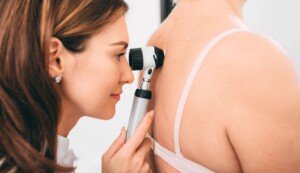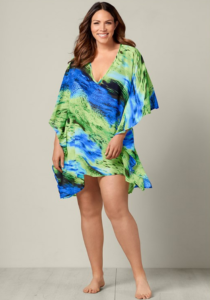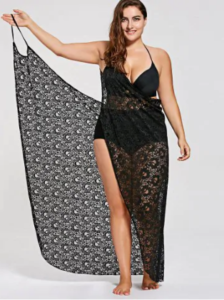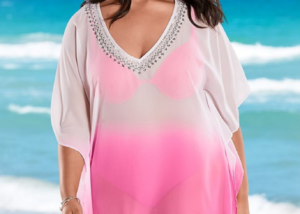
It’s not about self-love. Perhaps some plus-size women want to be covered up at the beach to protect against skin cancer.
Maybe the next full size woman you see covered up at the beach already has had skin cancer!
Body confidence influencers who keep pushing the idea that plus size women need to bare more skin are not taking into consideration the possibility that some overweight women — as well as thinner women — prefer to keep “covered up” to protect their skin from sun damage.
This not only includes cancer, but also precancerous lesions, sun splotches and premature wrinkles.
Those who are skin-health-conscious are apt to ask themselves the following:
Will there be a surge in skin cancer diagnoses 20 years from now, or even 10 years, due to all the women wearing bikinis to the beach because their favorite body image influencers keep encouraging this?
If there’s an uptick in skin cancer diagnoses years from now, there’ll be no way to prove that it was caused solely by the influx of women wearing bikinis who, in the absence of the body positive movement, would have worn cover-ups.
“The ‘self-love’ movement for abandoning cover-ups for bikinis at the beach will definitely have its consequences,” begins Erum Ilyas, MD, a board certified dermatologist who performs adult and pediatric medical dermatology, cosmetic dermatology and skin cancer treatment with Schweiger Dermatology Group.
“However, with the right guidance, this is not inevitable,” continues Dr. Ilyas.
“The bottom line is that the exposure to UV rays, especially when most intense during peak sun hours, damages the DNA of our cells.
“The effects of this damage are not always seen immediately.”
Body image influencers have a tendency to believe that if a large woman is in cover-ups at the beach, she lacks self-confidence, lacks self-love and needs to shed the cover-up.

She looks as confident as a same-size woman in a string bikini. Source: venus.com
Cover-ups to Protect from Skin Cancer
Some cover-ups are only for the hips and below. Others cover both the lower body and upper body.
Even if only the legs are covered, this is better than no shielding protection at all.
Depending on the heat and potential activities at the beach, a woman who wants to lower her risk of skin cancer may wear more than one variety of cover-up.
Or maybe the beachwear tunic is to shield the sun’s rays from a sensitive back.
Some body love influencers seem to think that every single overweight woman should toss out the cover-ups and don a two-piece swimsuit.
They associate cover-ups with a body image disorder or low self-confidence.
This is extremely backward thinking, especially since many slender women wear cover-ups.
Cover-ups at the beach are very handy for women — regardless of size — who burn easily and don’t want to hassle with smearing smelly sunscreen all over their back or middle.
Self-Love = Guarding Your Body Against Skin Cancer
This doesn’t mean you must give up bikinis if you normally wear them.
“This body positive messaging should not just be about body type but also being positive messaging about our innate melanin production!” says Dr. Ilyas.
“This would mean that I welcome the movement as long as it means putting sunblock on from head to toe and everywhere in between before putting your bikini on for a day at the beach! And, of course, reapply.”
Maybe that fat woman who’s “all covered up” was once diagnosed with melanoma, which — when not caught early, has a very poor prognosis.

There’s no shame in “keeping it covered up.” Source: rosegal.com
Or … maybe she’s never had melanoma — but has risk factors such as family history, childhood sunburns, very fair skin or freckles, and blue eyes.
Don’t be so quick to pass judgement on every plus size woman who won’t wear a bikini or keeps one-half of her body covered up in the sun.
She may have medical reasons for this that are not obvious to the onlookers sunning themselves with barely anything on their bodies.
It’s not fair to make assumptions about a woman based on what she wears to the beach.
For all you know, she’s an avid hiker, horseback rider, inline skater, skier, skydiver or competitive powerlifter.
Protecting your skin from melanoma or other forms of skin cancer is FAR more important than a social statement on the beach.
“If we consider the full picture on safe body positive messaging, then we will not necessarily see spikes in skin cancer,” says Dr. Ilyas.
 Dr. Ilyas has practiced dermatology in the Philadelphia area and Boston for 15+ years and has served as Assistant Professor of Dermatology at Drexel University College of Medicine.
Dr. Ilyas has practiced dermatology in the Philadelphia area and Boston for 15+ years and has served as Assistant Professor of Dermatology at Drexel University College of Medicine.
 Lorra Garrick has been covering medical, fitness and cybersecurity topics for many years, having written thousands of articles for print magazines and websites, including as a ghostwriter. She’s also a former ACE-certified personal trainer.
Lorra Garrick has been covering medical, fitness and cybersecurity topics for many years, having written thousands of articles for print magazines and websites, including as a ghostwriter. She’s also a former ACE-certified personal trainer.
.









































